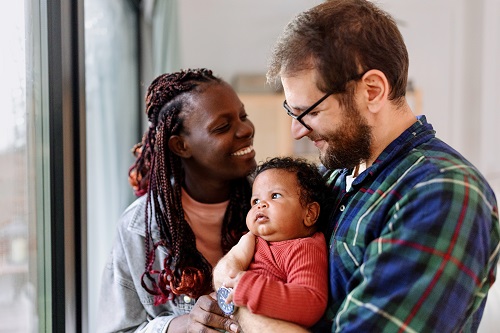Providing Comprehensive Support for Cancer Patients While Improving Adherence

Even the best therapies only work if a patient can take them as prescribed. But patients with cancer are often battling more than just their disease. Managing appointments and side effects on top of regular life circumstances can become overwhelming.
48% of patients don’t adhere to treatment regimens,1 for reasons including:
- Cost and complexity of therapy
- Interactions with food and medications
- Adverse side effects
- Simple human forgetfulness
We are committed to helping patients achieve better outcomes and avoid the complications associated with nonadherence. That’s why Accredo created our Oncology Therapeutic Resource Center® (TRC) — equipped with tailored tools and trained personnel to support patients and their caregivers throughout their journey. We also look beyond medications to connect patients with the support they need and build a holistic model of care.
Navigating Life Circumstances with the Help of Social Workers
Cancer patients face many obstacles on the road to recovery. As part of our Accredo Care Equity program, our social workers collaborate with each patient to assess and address any social determinants of health (SDOH) barriers that may negatively affect their oncology care. These life circumstances may include:
• Income and economic status
• Health care access and quality
• Housing concerns
• Food security
• Social support networks
• Access to transportation
Patients’ ability to keep up with their therapies often hinges on these factors. If they can’t make it to medical appointments or don’t have a safe and comfortable place to rest, patients may be more likely to discontinue treatment. Our social workers identify areas of unmet need and direct patients to resources within their communities that can provide:
• Utility and rent payment support
• Transportation
• Nutritious food
• Caregiver support
• Mental health resources
And since cost can make or break a patient’s decision to start or continue cancer therapy, our team proactively researches copay assistance options for every patient and connects them to the financial assistance programs that are available for 98% of specialty therapies our pharmacies supply .
Tackling Nutrition Challenges
Proper nutrition is the foundation of good health, especially for cancer patients. Nutrition and other healthy lifestyle habits can decrease the risk of cancer incidence and mortality by 10-60%, while untreated malnutrition and weight loss contribute to at least 1 in 5 cancer deaths.2
Up to 80% of cancer patients have reported malnutrition. Oncology nurse practitioner David Jennings II says, “Almost everyone I see is either malnourished or at very high risk of being malnourished. We in the oncology community should be more proactive in identifying and managing at-risk patients.”
Accredo’s research-based oncology nutrition education program features TherapEase Cuisine, which empowers patients to make informed dietary choices that complement their therapy regimen. TherapEase Cuisine recommendations help patients maintain their strength and energy while minimizing the side effects and optimizing the benefits of treatment. We provide tailored insights written and peer-reviewed by registered dietitians, Board-Certified Specialists in Oncology (CSOs) and Board-Certified Oncology Pharmacists (BCOP).
The program can offer additional support if needed. Accredo’s oncology dietitian trains nurses and pharmacists to counsel patients on nutrition-related concerns. Patients with complex or severe issues are referred directly to Accredo's oncology dietitian for one-on-one counseling. The dietitian can screen for malnutrition and food insecurity in addition to offering recommendations. Nutrition advice takes into consideration practical constraints, such as accessibility to and budget for groceries, while honoring each patient’s culture and personal food preferences.
Delivering Care During Natural Disasters
When storms or other natural disasters hit, our fulfilment centers mobilize to ensure oncology patients have access to uninterrupted care. During hurricane Helene, we identified individuals whose medications could run out due to shipment disruptions. We then worked with local governments to attain authorization to deliver those therapies through other methods, such as chartered flights and hand-deliveries to patients on the ground.
Innovative Logistics with IceGen Technology
Our innovative IceGen technology helps us respond to severe weather and successfully navigate emergency cold-chain logistics.
IceGen uses a specialized algorithm to determine the optimal packing configuration for oncology medications as they travel from our facility to the patient – ensuring the safety and stability of each therapy throughout its journey.
What comes next?
Whether we’re helping patients find financial assistance or hand-delivering their therapies during a national emergency, our Oncology TRC provides the highest quality of care to our oncology patients.
Read more about our services and systems of support by downloading our Oncology TRC whitepaper here: The Right Specialty Pharmacy for Oncology Therapies | Accredo.
- 1
1. V, R., Chacko, A. M., Abdulla, N., Annamalai, M., & Kandi, V. (2024). Medication Adherence in Cancer Patients: A Comprehensive Review. Cureus, 16(1), e52721. https://doi.org/10.7759/cureus.52721
- 2
Thompson, K. L., Elliott, L., Fuchs-Tarlovsky, V., Levin, R. M., Voss, A. C., & Piemonte, T. (2017). Oncology Evidence-Based Nutrition Practice Guideline for Adults. Journal of the Academy of Nutrition and Dietetics, 117(2), 297–310.e47. https://doi.org/10.1016/j.jand.2016.05.010


